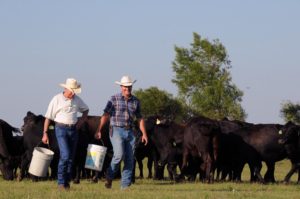From What Country Does Most of the Beef Consumed in the Us Originate?
**Update: due to the outpouring of positive comments submitted to the USDA, they have extended the deadline to Mon, September 17th. If yous haven't yet submitted comments, please do so today.
USDA calls for public comments on changing rule that hurts American ranchers and raises food safety concerns
Y'all read that right.
The United States imports beefiness from places like Australia, Canada, and much of Latin America. It then runs that beef through a USDA inspection and, if it passes, sticks a characterization on it that reads "Product of the U.S.A."
Thank you to a petition from the System for Competitive Markets (OCM), you may now have the power to help shut that loophole. Currently, the U.S. Section of Agriculture's Food Safety and Inspection Service has a dominion that allows beef and pork labeling to bear the phrase "Production of the U.South.A." if it is merely processed in the States. Yet, this rule doesn't require that the animal actually be raised in us.
USDA recently solicited public comments, based on OCM's petition, to change the rule. Those comments are due Sept. 17. Nosotros encourage you to submit your comments here.** A wide-based show of grassroots support will go a long way to helping alter USDA'due south mind near this policy.

The Western Arrangement of Resources Councils has fought for decades on State of Origin Labeling requirements for commodities. In 2002, WORC spearheaded efforts to become Country of Origin Labeling (COOL) into the Farm Bill. Unfortunately, in 2015 Congress voted to repeal COOL for beef and pork, under pressure level from lobbyists of corporate meatpackers who control more than 84% of U.Southward. cattle slaughter.
Never miss an opportunity to brand the west even better: receive our action alerts.
Research shows, most Americans stand with WORC on these problems. Some 93% of Americans polled desire to know where their food comes from, and 75% say that state of origin is a major factor in their buy. Role of it has to do with supporting their neighbors, but part of it also has to practice with protecting consumers.
For case, Brazil once imported a large share of beef into the United states under this rule. All the same in 2017, afterwards 1.9 1000000 pounds of Brazilian beef products were cited by USDA inspectors as "public wellness concerns," the United States suspended importation of Brazilian beef.
That hasn't stopped the catamenia of imported meat, however. A USDA study found that since 2014, the United states of america has imported more beef than information technology's exported.
Particularly troubling to eco-minded consumers is the impact this practise has on rainforest deforestation. A Yale School of Forestry and Ecology Studies paper found that more than 111 million acres of deforested Amazon in Brazil is now home to cattle pasture. By comparison, that'south roughly the size of Montana (94 million acres), with enough room to shoehorn Maryland and Connecticut in there, too.
Deforestation concerns aren't limited to Brazilian ranchers, either. Uruguay, the fifth-largest exporter of beef to the US, devotes more than seventy% of its state to pastures. Since 2001, it's leveled one-fifth of its forests. The story is like in Primal America, where exporters from Costa rica, Republic of honduras, and Nicaragua have as well felled rainforest cover to brand manner for "Product of the UsA." beef.
In addition to ecology concerns, there's the event of trust.
When Americans buy groceries, the "Product of the U.S.A." label is a meaning assurance every bit to the quality and safe of the product consumers are feeding to their families. Moreover, most hard-working American consumers want to support their neighbors, hard-working American ranchers and farmers. The "Production of the U.S.A." label tells them they're doing that. At that place's notwithstanding a real, considerable value and utility behind the Usa make. It's not just a label, it'south a legacy.
Yet, assuasive foreign importers to reap that benefit through the FSIS loophole, defeats the purpose of having whatsoever label at all. Moreover, it undercuts the toll paid to U.S. ranchers. In 2015, beefiness imports to the U.S. equaled $6.2 billion-worth of sales to foreign ranchers. Through supply and demand principles, increasing the supply of beef in the US naturally precipitates a drop in cost for domestic US beefiness suppliers.
The numbers bear this out. From Nov 2014 to October 2016, farm value of cattle fell from $3.67 per pound to $two.nineteen, per a Farm Assist written report. This represents billions of dollars of lost equity.
Granted, the plight of U.s.a. farmers and ranchers doesn't stem from this loophole alone. Significant concerns however be, including corporate consolidation and vertical integration of industry. There's also a lack of Country of Origin Labeling laws, and merchandise policy that hamstrings American producers.
That said, you lot tin can movement the event forward by voicing your comments into the public record. Comments need non be more than than a few sentences, and they will aid shape US Ag policy in a positive manner.
If yous deed on this now, you're continuing up for American ranchers. You're continuing up for American consumers. You lot're standing upward for U.S. nutrient sovereignty. Please, get out your comments today. **
**Update: due to the outpouring of positive comments submitted to the USDA, they have extended the deadline to Monday, September 17th. If you oasis't yet submitted comments, please do so today.
Read more than nutrient and agriculture stories HERE.
Larn more than:
Fact-cheque: Meatpackers are lying to you about Country of Origin Labeling
4 Reasons NAFTA two.0 is a Bad Deal
The Farm Bill Farce: Corporate ag reports huge profits while farmers struggle to feed their families
This is what changing the Dominant Narrative on Our Nutrient Organisation Looks Like

Aid create a healthy and sustainable West. Support WORC today.
Source: https://www.worc.org/were-importing-beef-and-labeling-it-product-of-the-usa/
0 Response to "From What Country Does Most of the Beef Consumed in the Us Originate?"
Post a Comment